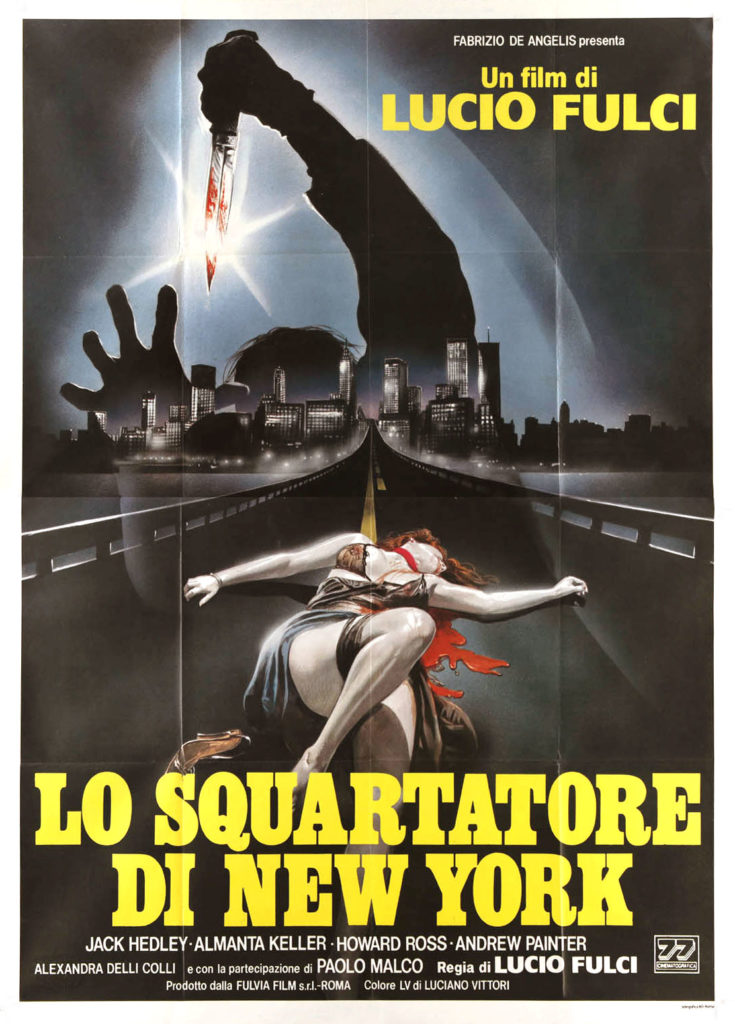Is it giallo? Is it horror? Is it both? In Italian cinema, the line between giallo and horror is often blurred, to the point it becomes insignificant. Thus it is with The New York Ripper, one of Lucio Fulci’s 1982 films. It has the most important tropes of giallo — women in danger, a serial killer on the loose, lots of nudity, and more blood than American audiences are used to in thrillers. It also has the feel of a slasher flick. Shoving the film into one category or another doesn’t do the viewer any good. And, if it ain’t horror, it can’t be part of the October Horrorshow.
The New York Ripper, as the title implies, tells the story of a serial killer stalking the streets of New York, and the efforts to uncover the killer’ identity. The killer is a nasty piece of work, going after the city’s sex workers and anyone else he can find who is the least bit kinky. It’s a disturbing fact that many real-life serial killers treat sex as just as important a motivator in their crimes as death, and Fulci doesn’t shy away from that. The nudity and simulated sex in this film is extensive and exploitative, but it is not gratuitous. Scenes with future victims in flagrante are necessary, as the killer would have passed them over otherwise.
The killings are being investigated by NYPD Lieutenant Fred Williams (Jack Hedley). He is aided by Dr. Paul Davis (Paolo Marco), a professor of psychiatry at Columbia University. The course of the investigation takes many weeks, and, truth be told, Williams and his people don’t make much headway on their own. All advances in the case come either by luck, or when the killer nabs another victim.
Early on Fulci lays suspicion on the character of Mickey Scellenda (Howard Ross), a creepy guy who frequents the live sex shows and porn theaters of Times Square looking for kinky women with whom to have sex. It could be misdirection on Fulci’s part, or it could not.  I won’t spoil that, but I will write that Ross did a fine job portraying someone who gives off some very bad vibes. A little unadvised conduct on Scellenda’s part sets the cops on his trail.
I won’t spoil that, but I will write that Ross did a fine job portraying someone who gives off some very bad vibes. A little unadvised conduct on Scellenda’s part sets the cops on his trail.
He got overenthusiastic on a subway ride one evening and attacked Fay Majors (Almanta Suska). She survived the attack, and the citywide manhunt for the killer now has a face and a name. The remainder of the film follows Fay and her boyfriend, Peter (Andrea Occhipinti), as they try to move on from the attack, while still being targeted by Scellenda. Meanwhile, Williams is trudging along trying to close the case.
The killer isn’t content to let Williams bumble along, though. He calls Williams at all hours of the day and night, taunting him, eventually threatening people he knows. The killer uses the phone often, calling Williams and victims alike. And this is where the film fails a bit. Fulci, for reasons known only to him, had his killer speak in a high singsong voice over the phone, then quack like Donald Duck. It’s high, unintentional hilarity in a film that is otherwise deadly serious. A few of Fulci’s movies have made it into the Shitty Movie Sundays Watchability Index, and if the rest of this movie had been as stupid as the killer’s phone voice, The New York Ripper would have joined them.
The finale takes expected, and unexpected, twists, using some dishonest misdirection to keep viewers from guessing the true outcome until the very end. A master of the craft of storytelling could have done things better, but Fulci is still no slouch. It’s just something of a shame that cheap trickery was so key to his ending.
Despite that, The New York Ripper is a compelling thriller. Besides Fay and Peter, the film also dives into the life and desires of would-be victim Jane Lodge (Alexandra Delli Colli), whose kinks lead her to put herself at risk in sleazy pool halls and theaters all over the city. Her story amounts to an act on its own, and serves to add depth to both the overall plot, and to the character of Scellenda.
The New York Ripper feels like it would be a polarizing film among an audience. It’s one of Fulci’s better films, but doesn’t rise to the best of giallo I’ve seen. It does well with tension, pace, and most storytelling elements. Acting is hit or miss. What I did appreciate quite a lot was in its portrayal of New York City. It’s a well-done snapshot of a strange time in that city’s history.
